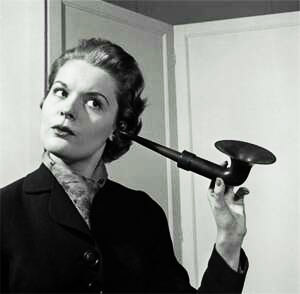 J-School Redux
J-School Redux
The very best instructor I had in journalism school was this guy who’d been City Desk Editor for a major metropolitan daily. His name was Itule (eye-TOO-lee).
On the first day of class, Itule stood up front and said: “Now I know you’ve all heard horror stories about me. So, tell me what you’ve heard. Or, ask me if what you’ve heard is true. This is your chance; I promise I won’t lie to you. But, let’s get it out in the open — so you know what to expect, and I know what you think you expect from me.”
After a lingering silence, one young woman said, “I heard you make people cry.”
Itule nodded his gray head sagely. “Well, I guess that one’s sorta true. I don’t set out to make people cry. I mean: who wants to make kids cry? But . . . people have certainly cried in my class.” He shrugged his bison-like shoulders. “All I really did, though, was just tell them the truth about their writing. They’re the ones who chose to cry.”

A guy’s voice rang out: “Do you really have a rubber stamp that reads:
GARBAGE ?”
“I do. It’s on my desk, with a big pad of red ink. But the university won’t let me use it anymore; too many people complained that it hurt their feelings.”
I knew instantly that I was going to like this guy!
After all, I’d known a ton of guys like him when I was in the army. These were men who knew their job, and didn’t mind letting you know it — particularly if you were messing up. The reason I get along so well with guys like this, is because they’re usually the ones who can give you all the hot tips for doing the job in an excellent manner. They’re harsh in their mannerism, but they can explain chapter and verse where you went wrong, and (more importantly) how to correct it — so you don’t step on your equipment the next time.
As I suspected that first day in class, Itule was this kind of guy. My papers came back with seas of red ink. And, one day, with the note “OH GOD!” near the end. (I asked, “Is that “Oh, God this stinks?” or “Oh, God, this great?” “Neither,” he said. “It’s [his face crumpling as if he’d just been immersed in sewage]: “OH, GOD! What did I ever do to you? Why do you punish me, by sending me people who insist on writing crap like this!?!”)
Like I said: Harsh in his mannerism.
But, whenever I asked why something was wrong or what was wrong with it: he’d fire off a string of eye-opening answers at machinegun speed. I always asked him what I’d done wrong, but never without a notebook and pen in my hands — ready to write fast and often for several pages. If you wanted to learn to write, Itule was a goldmine.
Rough but invaluable, that was Itule’s help. And I loved him for it.
Sad Anthology
In honor of Itule, I feel moved to make a little harsh criticism about a recent mystery anthology I read this past week. And to make a few (perhaps) helpful suggestions to folks thinking of participating in any upcoming anthology, or maybe to just mention a little insight I gleaned from reading this one.
I hope it goes without saying (which certainly won’t keep me from reiterating) that none of the SleuthSayers are writers of stories in the aforementioned anthology.
And, to any writers who did contribute to it, who may be reading this, I’d like to (probably mis—) quote the great Cos: “Better watch out, or ya’ just may learn somethin’.” Or, maybe not. Perhaps you’ll just be caught by the humor of my harshness. One thing you can rest assured of, however: my bark could be worse; at least I don’t have a big red stamp reading GARBAGE!
So . . . This contemporary anthology I read . . .
. . . while it had a few good reads — was primarily populated by stories so dead, they seemed more corpse than corpuscle. All the stories in this anthology (which shall remain nameless, to protect those innocent few) were mysteries, and most of the plots were pretty solid (if sadly predictable). The writing mechanics showed a workmanlike bent: I could see the landscape and setting, watch the bodies in motion. But, there was no life! No juice! It was like watching a play staffed by cadaverous marionettes. A cover blurb called it a “crackling good read” and I think I understand why: This stuff was so dry, the very pages nearly crackled with desiccation when I turned them.
We’ve all heard the adage: “Write what you know.” But, there’s an element at play in this phrase I often think some folks overlook. (Most of the writers in this anthology certainly did.)
I can’t begin to enumerate the writing books or articles which follow that adage to write what you know, with an explanation similar to: “If you’re a homemaker, write about a homemaker: the struggle to find a continued spark after twenty years of marriage, say, or perhaps the vicious personal impact of marital betrayal. If you’re an investment banker, maybe you can write a mystery about embezzlement. …”
What I’d one day like to run across, (and somebody may have mentioned this before me) is a book that says: “Writing what you know doesn’t necessarily mean writing about your particular area of expertise. Remember: You have a lot of life-experiences to draw on. Recalling the emotions you experienced when your childhood dog was run over, for instance, can infuse a passage concerning loss with a very honest breath of life and feeling—IF you do a good job of getting those emotions down on paper.”
Now I know that a lot of people reading this just flicked their fingers in the air while rolling their eyes skyward and saying, “No s@%t, Sherlock! That’s the hard part—getting it down on paper!” And, I’m not saying I disagree. I think that IS the hard part.
I once read that Dean Koontz became so frustrated, one time, that he banged his head on his desk to the point where he now has to spray his forehead with Lemon Pledge each morning. And I gotta say: when I’m trying to find that elusive word or phrase, when I’m hammering and hammering at a paragraph because the words are all there, but the way they’re arranged – the word order, the various sentence lengths, when and where commas need to replace conjunctions to get just the right feel – is just not right, well then I begin to consider investing in a can of Pledge for my own desk!
This is where I sometimes think actors have it over writers—because actors usually get to use their entire bodies to get their point across. As writers, we’re forced to work within a very narrow “band-width” of communication: Print Media. We don’t get to drop a tear or two in front of the reader, hoping our emotions will be caught by him or her. Instead, we have to connote emotion to — and hopefully create emotion within — readers solely through the written word. And that’s a toughy.
Good actors are taught to emote
(or else they just learn to do it, or maybe some are just born with this innate ability—I don’t know).

But, however they do it, good actors emote: They recall how they felt when fluffy got hit by that car, and they use this memory to yank tears out of their eyes over the supposed death of some other character in a play or movie, to melt their mouths with mournful muscle contractions, to rip wet animal cries from deep inside their guts — cries that make us flinch in our seats and gasp as we tear-up in sympathy.
I think you know what I’m talking about, though it’s pretty tough to explain. And, to (very) roughly paraphrase a certain Supreme Court Justice: “I can’t really explain what happens, but I darn well know it when I see it.” An actor who properly emotes, can claw open that “emotion bag” in the gut, and let it come bubbling out through every pore. What comes bursting forth may be heart-wrenching, disgusting, beautiful, grotesque, or even joyful – but it strikes a viewer as being very real. Because that actor has somehow tapped into an emotion s/he felt before, and spilled it out onto stage or screen.
I know about emoting, because I went to a pretty good on-camera acting school when I was a teenager. I never got any acting jobs, but I did learn about this critical tool. And I’m not saying I’m a good actor; just that I went to a good acting school. I myself probably couldn’t act my way out of a non-existent box! Even if I did paint my face white, then gave myself a big red heart-shaped mouth, added surprise lines around my eyes and wore black pants with a stupid striped shirt. I’m not a good actor; that’s one of the reasons I write.
And, as I pointed out earlier, I think writing is even harder than acting in some ways, because writers are limited to such a narrow band-width of communication — which makes it pretty tough to strike an emotional chord with the audience (readers).
But, that’s no excuse for not even trying!
And “not even trying” to tap into emotion is what lies at the root of the problem suffered by all the stories in this anthology (well, most of them at any rate). I’ll limit details in order to obfuscate, but to use one story as an example: This old guy stumbles across a body in the desert, but is unfortunately surprised to also discover the murderer, whom he knows. Consequently, the murderer must now kill the old guy, to cover the murderer’s tracks.
Now, you see what I mean: that’s a pretty good plot, lots of tension bursting at the seams. At least, there would be — if the old guy were actually alive in the reader’s mind.
Unfortunately, he never came to life in mine, because of the way the writer handled him. Neither did the murderer. Instead, they came off like “Print-Zombies”— a couple of stiffened cadavers propped up by two-by-fours, the writer jerking strings to move their appendages. Or, if you prefer, they read like a play being performed by sixth-graders —stiff, wooden and incompetent.
The old guy, who should have been terrified, never even broke into a sweat! And the story is set in the desert! Maybe you’ve heard that the sun evaporates perspiration so fast, in the desert, that you don’t ever seem to sweat. And, as a nearly life-long desert dweller, I can tell you that this is a good rule of thumb. BUT . . . it doesn’t hold true when you’re scared.
My experience is that, when I’m scared in the desert, the heat seems to multiply. And the sweat pours out in buckets. It gets in my eyes, drips off my nose. Sweat soaks my shirt so badly, that it sometimes pastes that shirt to my body. I once drew a rapid sand table in the ground, when I was scared in the desert one time, and we were planning for an immanent engagement; when I was done, desert dust had stuck to the sweat on my finger and coated it with mud I had to wipe off on my pants.
Now, please notice: I prefaced that last paragraph with: “My experience is that . . .” In other words, I drew on my own experiences with fear, to explain what happens to someone afraid in the desert. Other physical manifestations of fear I’ve encountered include: weak-hinged knees that feel like they might fold, and dump my body in the dirt if I don’t watch out; a moderate muscle-strain type of pain in my gut; and an ache in my palms between the base of my thumb and first finger, which seems to rob my hands of the ability to grasp or hold things.
Oddly, perhaps, this last one came in handy in combat, because the salve for that ache was to jamb the pistol grip and forward handguard (grenade launcher tube) of my M-203 into my palms as hard as I could get them. (An M-203, for those who don’t know, is an M-16 w/ a 40 mm grenade launcher attached to the handguard, so that the grenade launcher is clipped below the rifle barrel.) The harder I screwed that pistol grip and forward hold into my hands, the more that ache in my palms ebbed away; this means I never had to worry about dropping my weapon during a fire fight. I had a death-grip on it! And, I got the same affect when I held my M-9 Berretta (two-hand grip, with modified isosceles stance when possible), which helped keep my pistol shot-group nice and tight.
Controlled fear also assisted me in combat, by heightening my senses, which resulted in sharper vision, keener hearing, greater attentiveness (I mean a small snapping twig will wake me instantly, in a denied area.) and quicker reflexes. These are all part of being afraid. They’re part of the physical manifestations of fear. When writing of a character who is feeling fear, I try to incorporate at least some of this stuff into that character’s behavior and/or description.
Sadly, that old man in the story exhibited none of this behavior. The writer wrote that he was scared . . . but that’s it. S/he (I’m hiding ID clues here, not confused) described the scenery very well: I could see the land for miles around. But, I never could see the old man’s fear. S/he evidently didn’t think to show us that. Or even the murder’s fear of getting caught, which must have been present in the character. Otherwise, why would the murderer feel the need to kill again to cover the first murder?
I could trot out additional examples in which the writers failed to describe action that would indicate their characters’ emotions. However, I think the one above is enough to demonstrate what I mean.
What I have to suggest is very simple.
When a critique partner mentions a lack of emotion, or mentions a sense of staleness, or lifelessness about a work in progress, my suggestion is: check for character emotion indicators in the story. If they aren’t there, dig deep inside your own memory. Gird your loins and claw open that “emotion bag” deep down in your gut. Then let it all spill out across the page.
There can be other reasons for staleness (we’ve covered a few on SleuthSayers in the past), but this can be one of them. So, look for it. Better yet: Tear open your emotions the first time you make that trek through the manuscript—when you’re cranking out your first draft—and let fly! Because, searing emotion on the page can turn mediocre writing into a great story. And good money in your pocket.
I won’t be around to comment much on Friday, when this post goes up. My mother died on Saturday morning, and her funeral is on my blog day. But, I’ll be back with another post in two weeks.
And, while I find it (fairly) easy to tap my emotions, I find it
extremely difficult to carve those emotions onto paper in a way that elicits them among readers. So . . .
During the interim, I think I’ll buy a can of Lemon Pledge!
--Dix























 by Fran Rizer
by Fran Rizer











